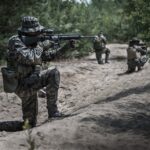The Impact of PTSD on Soldiers and Veterans
Post-Traumatic Stress Disorder (PTSD) is a mental health condition that can develop after a person experiences a traumatic event. Soldiers and veterans are particularly vulnerable to developing PTSD due to the unique and high-stress environments they are exposed to during their service. The impact of PTSD on soldiers and veterans can be profound and can affect every aspect of their lives.
Symptoms of PTSD
PTSD can manifest in a variety of symptoms that can be both physical and psychological. Some common symptoms of PTSD include flashbacks, nightmares, severe anxiety, and uncontrollable thoughts about the traumatic event. Individuals with PTSD may also experience irritability, difficulty sleeping, and feelings of detachment from others. These symptoms can significantly impact a soldier or veteran’s ability to function in their daily lives and can lead to significant distress.
Impact on Relationships
One of the most significant impacts of PTSD on soldiers and veterans is its effect on their relationships with others. The symptoms of PTSD can cause irritability, anger, and difficulty trusting others, which can strain relationships with loved ones. Soldiers and veterans may find it challenging to communicate their feelings and may become isolated from friends and family members. This can lead to feelings of loneliness and further exacerbate the symptoms of PTSD.
Impact on Mental Health
PTSD can have a profound impact on a soldier or veteran’s mental health. The constant state of hypervigilance and fear that comes with PTSD can lead to significant anxiety and depression. Individuals with PTSD may also experience feelings of guilt, shame, and worthlessness, which can further exacerbate their symptoms. Without proper treatment, PTSD can lead to suicidal thoughts and behaviors in soldiers and veterans, making it crucial to seek help as soon as possible.
Impact on Work and Daily Life
PTSD can also impact a soldier or veteran’s ability to work and function in their daily lives. The symptoms of PTSD, such as flashbacks and severe anxiety, can make it challenging for individuals to concentrate and perform their job duties. Soldiers and veterans with PTSD may also struggle with managing their emotions and may have difficulty controlling their reactions to stressors. This can lead to difficulties in maintaining employment and can have a significant impact on their financial stability.
Treatment Options
Fortunately, there are effective treatment options available for soldiers and veterans with PTSD. Therapy, particularly cognitive-behavioral therapy (CBT), has been shown to be highly effective in treating PTSD. CBT helps individuals identify and challenge negative thought patterns and behaviors related to the traumatic event, leading to a reduction in symptoms and an improved quality of life. Medications, such as antidepressants and anti-anxiety medications, may also be prescribed to help manage symptoms of PTSD.
Support and Resources
In addition to treatment, soldiers and veterans with PTSD can benefit from support and resources available to them. There are numerous organizations and support groups specifically designed to help individuals with PTSD cope with their symptoms and connect with others who are experiencing similar challenges. The Department of Veterans Affairs (VA) also provides a wide range of services for veterans with PTSD, including counseling, therapy, and support for their families.
Conclusion
The impact of PTSD on soldiers and veterans is significant and can have far-reaching consequences on every aspect of their lives. It is crucial for individuals with PTSD to seek help and support as soon as possible to prevent further deterioration of their mental health. With the right treatment and support, soldiers and veterans with PTSD can learn to manage their symptoms and lead fulfilling and productive lives. It is essential for society as a whole to recognize the sacrifices made by soldiers and veterans and to provide them with the care and support they deserve.


